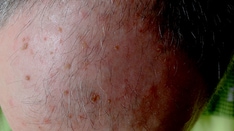Abstract and Introduction
Abstract
Dietary supplements, including vitamins and their derivatives, have been utilized within the field of dermatology to treat a variety of skin conditions. Antioxidants inhibit oxidation and decrease cellular damage caused by free radicals, potentially preventing DNA damage due to UV radiation. Laboratory studies have demonstrated promising results supporting the possible role of antioxidants for prevention of skin cancer related to UV exposure. We review the effects of frequently encountered antioxidants and vitamins suggested for the chemoprevention of melanoma and nonmelanoma skin cancer (NMSC) in humans.
Introduction
Nonmelanoma skin cancer (NMSC) is the most common cancer in the United States, and cutaneous melanoma is projected to be the fifth most common form of cancer in 2022, with increasing incidence and high potential for mortality.[1–3] Estimates indicate that 35% to 45% of all cancers in White patients are cutaneous, with 4% to 5% occurring in Hispanic patients, 2% to 4% in Asian patients, and 1% to 2% in Black patients.[4] Of the keratinocyte carcinomas, basal cell carcinoma (BCC) is the most prevalent, projected to affect approximately 33% to 39% of White males and 23% to 28% of White females in the United States during their lifetimes. Squamous cell carcinoma (SCC) is the second most common skin malignancy, with a lifetime risk of 9% to 14% for White males and 4% to 9% for White females in the United States.[5] The incidence of melanoma continues to increase, with approximately 99,780 new cases expected in the United States in 2022.[1]
UV-induced DNA damage plays a key role in the pathogenesis and development of various skin malignancies.[6] UV radiation from sunlight or tanning devices causes photocarcinogenesis due to molecular and cellular effects, including the generation of reactive oxygen species, DNA damage due to the formation of cyclobutane pyrimidine dimers and pyrimidine-pyrimidone, melanogenesis, apoptosis, and the increased expression of harmful genes and proteins.[6] The summation of this damage can result in skin malignancies, including NMSC and melanoma.[6,7] Dietary antioxidants theoretically help prevent oxidative reactions from occurring within the body, and it has been suggested that intake of dietary antioxidants may decrease DNA damage and prevent tumorigenesis secondary to UV radiation.[8] Antioxidants exist naturally in the body but can be acquired exogenously. Investigators have studied dietary antioxidants in preventing skin cancer formation with promising results in the laboratory setting.[8–11] Recently, more robust human studies have been initiated to further delineate this relationship. We present clinical evidence of several frequently utilized antioxidant vitamins and their effects on melanoma and NMSC.
Cutis. 2023;111(1):33-37, 48. © 2023 Cutis









